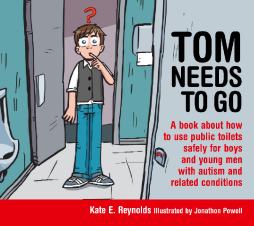
Additional Information
Book Details
Abstract
When Tom is out shopping, he needs to go to the toilet. Tom knows that public toilets are different to his toilet at home. There are urinals and cubicles and he has to decide which to use.
This visual resource helps parents and carers teach boys and young men with autism or other special needs about how to use public toilets safely. It covers the subtleties of social etiquette including where to stand and look, as well as practicalities such as remembering to lock the cubicle door. With simple and effective illustrations throughout, the book is the perfect starting point for teaching independence when using public toilets.
This little book offers a visual resource to parents and carers to teach boys and young men with the condition how to use public toilets safely. It covers the subtleties of social etiquette... It offers a good starting point for teaching independence and might also prove a useful resource for teachers in sex education classes.
Autism eye
The Tom books about privacy and puberty for boys on the autism spectrum are a wonderful resource for families and young people with ASD. Each of the books addresses a range of relevant topics, to promote safety and healthy practices that will ensure better inclusion in society for boys and men on the spectrum. I have met hundreds of parents and teachers who often find that these issues related to puberty are in most urgent need of being addressed - finally, books that help us help our sons, brothers, students, and friends!
Dr Helen McCabe, Executive Director, The Five Project for International Autism and Disability Support (www.thefiveproject.org), US
Thankfully, we have reached a point where society recognizes that all people, including those with a developmental disorder such as autism, are sexual beings who have a right to knowledge and to be safe. But there are aspects of sexuality that are challenging and not easy to teach. These attractively illustrated books, with their clear, anatomically correct pictures and simple, unambiguous text, deal bravely with these topics and will facilitate discussion and learning. They will be a very welcome addition to the bookshelves of families who have an adolescent boy on the autism spectrum.
Sarah Attwood, author of Making Sense of Sex
Kate E. Reynolds, MSc (Dist) BSc. RGN. PGDipHEd. PGDipCouns., worked for the UK's National Health Service for 18 years, seven of which were in HIV/Aids and sexual health as a Clinical Nurse Specialist, Senior Counsellor and staff trainer. In 2005 Kate's son was diagnosed as having 'classic' autism with intellectual (learning) disabilities. Since then, Kate has written several books for JKP about sexuality education and autism/intellectual disabilities. She is a researcher and public speaker; in 2016 she spoke at an All Party Parliamentary Group meeting about sex education and disability and speaks extensively with parents and caregivers.
Jonathon Powell completed a Diploma of Fine Arts and a Bachelor of Animation at Griffith University, Queensland. He has illustrated material for Family Planning Queensland, including several brochures, an education manual, 'Talking About It', and a CD-ROM package, 'Puberty Plus'. Jonathon has also illustrated 'Making Sense of Sex' by Sarah Attwood, published by JKP. He lives in Brisbane, Australia.
Full marks to author and mum Kate Reynolds and illustrator Jonathon Powell for tackling a tricky subject with such style and humour. Their set of three books - What's Happening to Tom?, Tom Needs to Go and Things Tom Likes are aimed specifically at young boys with autism to help them understand their developing sexuality and to behave in ways that are socially appropriate and will keep them safe... The books act as a visual guide... An honest approach like this will help them to learn quickly and to ask you questions without any sense of shame or embarrassment.
Debbie Elley, Co-editor
AuKids Magazine
This series is perfect for use in sex education classes. An excellent and very helpful choice for professionals working with people with ASD!
Ioannis Voskopoulos-Labrini Ioannou, psychologist
